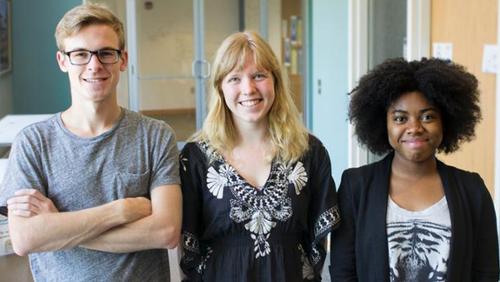All News
-
Out of Utica’s some 60,000 residents, as many as a quarter of them could be refugees, Shelly Callahan, the executive director for the Mohawk Valley Resource Center for Refugees (MVRCR), revealed in a recent New York Times article. The Center is a not-for-profit organization that has helped resettle thousands of immigrants from over 30 countries since its founding in 1979. Today, Utica is truly a mix of cultures, reflected in the more than 40 languages spoken by the 2,700 students at Utica’s Proctor High School.
Topic -
Approaching 501 Park Street in Syracuse, a visitor would see what looks like a Catholic church. Though this site was once home to the Holy Trinity Roman Catholic Church, the building is now being converted into a mosque. As neighborhood demographics change, the need for specific religious spaces tends to shift as well. This summer, three students are working on a Levitt Group Research Project, “Sacred Spaces in Transition.”
Topic -
Hannah Grace O'Connell ’14 and Alison Ritacco ’14 presented “Sharing Sacred Space: Possibilities and Pragmatics” at the 45th annual Pioneer America Society: Association for the Preservation of Artifacts and Landscapes conference on Oct. 11.
Topic -
Andy Chen ’16, John McGuinnis ’16 and Zachary Pilson ’16 are applying the science behind a survivalist water-collecting technique to develop an alternative energy-generating device. With a Levitt Research Group Grant, the team is utilizing a method similar to solar stills to generate energy from falling condensation.
Topic -
Through our contemporary media, readers frequently hear about the decline of religion in America. Alison Ritacco ’14 and Hannah Grace O’Connell ’14 are working with Visiting Associate Professor of Religious Studies Brent Plate and Assistant Professor of Art Robert Knight, to examine the realities of religious life in the Utica and Clinton areas, which may complicate that common conception. In their Levitt Group Summer Research project, “Religious Spaces in Transition,” they are focusing on how local religious institutions adapt to change.
Topic -
Utica's Theodore Roosevelt Elementary School, now with a crumbling brick exterior and overgrown foliage, stands in stark contrast to the educational institution it once was. In their Levitt Group project titled “BRICKS: An Intersection of Architecture and Community,” three students are investigating the relationship between the city’s physical identity and its surrounding community.
Topic -
In a Levitt Center group research project this summer, Samantha Sherman ’15, Timothy Cowan ’15 and Kelly Osterling ’15 are searching for factors that drive success in small cities. Unique policies are typically implemented in micropolitan areas (defined as containing an urban core of at least 10,000, but less than 50,000, population), to better serve the local economies and populations. The students are finding similarities between these successful or failing communities and will introduce constructive policy reforms.
Topic -
Hamilton’s open curriculum encourages students to explore interdisciplinary studies, combining multiple subjects in an original and constructive manner. When one group of students became aware of an issue plaguing the local community, they knew that by using their unique research interests they could tackle the issue comprehensively. These Levitt Group Research Grant recipients will pursue their passion for aiding others while contributing to a larger body of scientific knowledge.
Topic -
Associate Professor of Anthropology Chaise LaDousa and Hamilton seniors Paige Cross and Anna Zahm presented papers at the Northeastern Anthropological Association Conference.
Topic -
Learning English is one of the most daunting tasks for newly arriving immigrants in the United States, and it can be a task that is accompanied by little support. Anna Zahm’13, Grace Parker Zielinski ’14 and Melissa Segura ’14, have spent their summers working to combat this problem by providing much-needed assistance to English language adult students at the Utica access site for the Madison-Oneida Board of Cooperative Educational Services (BOCES).
Topic


